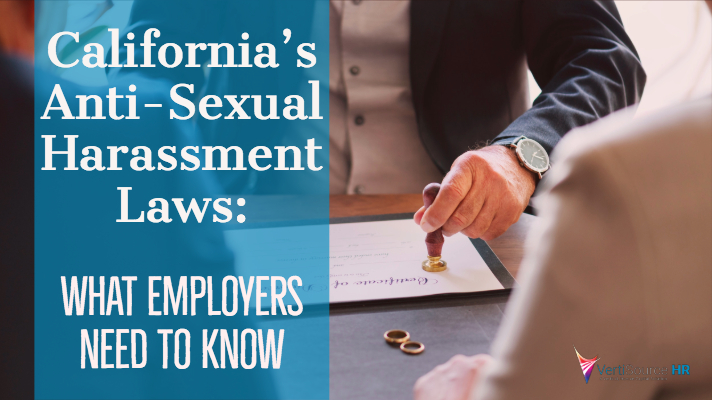California has joined in the fight against sexual harassment in the workplace, enacting new regulations and laws that will take effect in 2019. In September of 2018, California Governor Jerry Brown signed four new bills into law, a major step in the right direction following the #MeToo and #TimesUp movements. Employers should keep themselves up to date on these new regulations as we move into the new year. Here is a break down of these four new laws so employers will know what to expect:
SB 1343
With Senate Bill 1343, business with five or more employees will be required to provide sexual harassment prevention training to all workers by January 1, 2020, and every two years thereafter. Up until this bill, businesses with only 50 or more employees needed to provide this training to supervisory employees only. In addition, employers must ensure similar training in multiple languages for all workers so they know what sexual harassment is and what their rights are under the law. Making this training mandatory is important because soon anti-sexual harassment training will be implemented into more California businesses, most that have not had it before.
However, this does mean that employers will need to reevaluate how they do things. “While this law is obviously well-intentioned to ensure that almost every California employee is aware of harassment protections, there is no getting around the fact that employers and HR professionals will need to re-examine their existing harassment programs or potentially develop a new one,” explains Michael Kalt, an attorney with Wilson Turner Kosmo in San Diego and the government affairs director for the California State Council for the Society for Human Resource Management (SHRM).
There will be two courses, one for managers and one for employers that will incorporate the necessary state references and meet the standards for the state’s sexual harassment prevention training.
Delivering and creating these trainings can feel like a big task for employers as they will need to decide if they want to provide large-scale, small-group or other training formats. Employers should start planning now as the 2019 fast approaches. If help is needed, the new law directs the California Department of Fair Employment and Housing to prepare training materials that comply with the new requirements, which employers can borrow from if desired.
SB 820
Brown also signed Senate Bill 820 in September, pushed by Sen. Connie Leyva (D-Chino), which prohibits non-disclosure provisions in settlement agreements related to civil or administrative complaints of sexual assault, sexual harassment, and workplace harassment or discrimination based on sex. While employers may not have been motivated in the past to settle claims without a nondisclosure agreement, SB 820 states that employers and their attorneys will need to review their standard settlement agreements to remove any overbroad restrictions. The law will apply to agreements that are entered into on or after Jan. 1, 2019. In addition, SB 820 covers more than just sexual-harassment-related nondisclosure agreements, applying to any workplace discrimination claims based on sex.
SB 1300
Senate Bill 1300, sponsored by Sen. Hannah-Beth Jackson (D-Santa Barbara) toughens the level of liability that employers face if discrimination and harassment are conducted in the course of business by outside contractors and other non-employees. It significantly expands liability under the Fair Employment and Housing Act (“FEHA”), lowering the burden of proof to establish harassment. It also “provides stricter guidance on what constitutes “severe or pervasive” conduct that rises to the level of unlawful harassment”, according to Fox Rothschild Attorney of Law. Furthermore, it expands FEHA protection to any harassment by contractors, rather than just sex harassment and denies the prevailing defendant from being awarded attorney’s fees and costs unless the court finds the action was frivolous, unreasonable, or groundless. This is significant to the entertainment industry where so many positions are held by freelance and contract employees rather than full-time staff. Broadening the term “employer” could help California stop the sexual harassment epidemic in the entertainment industry, especially. Employers should take note that these changes will also take effect at the start of the new year.
SB 826
Finally, Senate Bill 826, requires public companies based in California to have at least one woman on their board of directors by the end of next year. While this isn’t entirely employment-related, it correlates with harassment in the workplace. According to Variety, “sexual harassment experts say the presence of women at the highest levels of decision-making can have a big impact on how companies handle sexual harassment and discrimination problems.” California will maintain an online database to publicly track companies and their compliance to this law, requiring two female board members if a company has five directors, or three if the company has six or more directors.
Employers should expect all these changes to be mandated within the new year. For more information on California anti-harassment laws, click here.
If you are a New York employer, you may want to read our blog post: New York’s New Anti-Sexual Harassment Laws: What Employers Need to Know.


